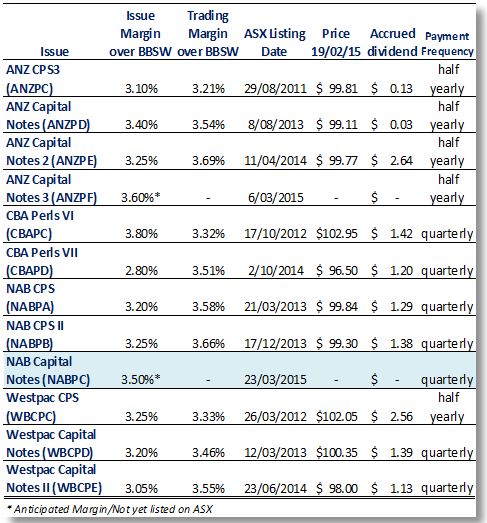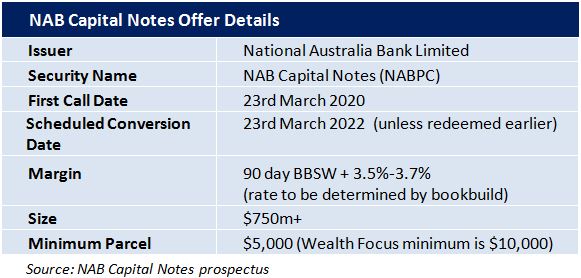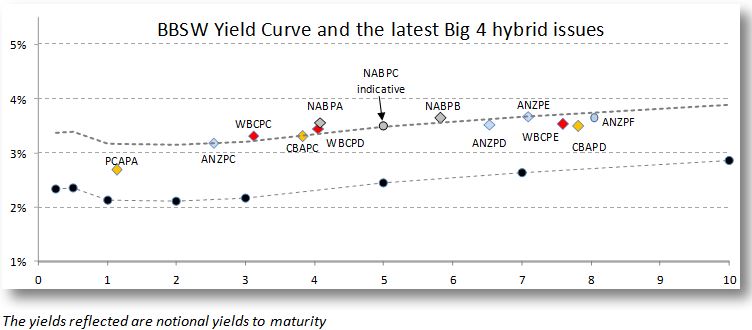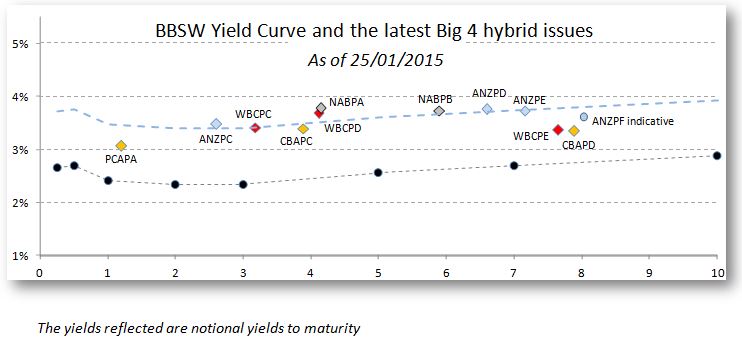NAB has just announced the launch of their latest income hybrid: NAB Capital Notes.The first round of access is through a broker firm allocation, prior to shareholder offer and listing in March.
The Notes will pay a quarterly coupon of 3.5%-3.7% (rate determined by the bookbuild) over the 90 day bank bill swap rate (BBSW), which was 2.33% as of the 19 February, with an initial indicative rate of 5.83%-6.03%pa. (The first pricing is due to be set on date of issue) The Notes are expected to redeem on the 23rd March 2020* and will be tradable on the ASX.
* It is expected that the issue will be repaid at the first opportunity in March 2020 with a scheduled conversion in 2022 (subject to mandatory conditions not being breached).
How does this compare?
The list of newer style hybrids containing the additional clauses required to qualify them under APRA’s capital requirements continues to grow, and its relatively easy to find pricing comparables.
The closest comparables are obviously NABPA and NABPB, both issued in 2013, and mature either side of NABPC (4 years and 6 years respectively).
A quick analysis
NABPA and NABPB, currently trade at $99.84 (inc. $1.29 accrued dividend) and $99.30 (inc. $1.38 accrued dividend) respectively, with effective margin to expected maturity of 3.58%pa and 3.66%pa.

By contrast, ANZPF, ANZ’s latest issue which has yet to list, will issue at a margin of 3.6%pa over the BBSW but has a further 3 years to anticipated redemption.
Investors would do well to remember a longer investment term should be rewarded with a higher premium, making this attractive relative to the recent ANZ offering.
Since our recent review of ANZPF, hybrid market spreads have contracted reflecting this month’s 0.25% RBA rate cut. The anomaly of WBCPE and CBAPD’s lower yields has also started to normalise with their prices dropping (increasing yields) and the yields offered for longer periods are typically higher than shorter investment time frames. This should continue and highlights the relative value in the 4-6 year range hybrids right now.
Non-viability Clause, Capital Trigger Event and Inability Event
Sorry for repeating ourselves, this is almost becoming a disclaimer; Investors should familiarise themselves with these clauses as we see these as some of the key risks of investing in newer style hybrids. These clauses are now well established within the market and have become accepted as a requirement in order to issue capital that conforms with APRA requirements.
In layman’s terms, should the bank fall on hard times, the hybrids convert to ordinary shares, likely leading to a loss in capital value and in some instances, if the issuer is unable to issue further ordinary shares at time of conversion, hybrid note holders lose their investment.
Clearly this is extremely unlikely and in this type of scenario, you are likely to have bigger things to worry about than just the value of your hybrids, but it reflects the increased risk that note holders have come to accept as the norm with hybrid investment and it would be foolish to think of hybrids as term deposits.
Our View
It’s a good time to reflect on where rates were just 3 weeks ago. NABPA and NABPB were trading at a margin of close to 3.75%-3.80% and ANZ Capital Notes 2 (ANZPE) touched a margin of close to 4%.
The RBA rate cut and surprise strength in the market is perhaps fortunate for NAB and ANZ. CBA have been the butt of many jokes by having issued CBA Perls VI (CBAPC) in Oct 2012 at a margin of 3.8%, and had we not seen a rate cut, we would not have been surprised to see a margin closer to 4%. We can just imagine CBA’s Head of Debt Markets, saying his prayers since ANZ announced their issue in January, pleading with the almighty that rates continue to blow out, just so he no longer has to bear the brunt of industry ridicule.
Our view is NAB Capital Notes are in line with the current market. We would have a preference to buy NABPA and NABPB on market, they trade at slightly higher yields (to maturity) and offer slightly better terms than the new Capital Notes. However, once you’ve considered the cost of brokerage and the attraction of a higher running yield, you’re splitting hairs.
Some investors may look at this offer and wonder how a lower margin of 3.5%pa versus ANZPF’s 3.6%pa over the BBSW is a better deal. Key points of difference are the quarterly payments vs ANZPF’s semi annual payments (typically worth an extra 0.1%pa to quarterly payments) and the additional security of a shorter duration.
Longer duration issues like WBCPE, CBAPD and ANZPF are not adequately rewarding investors for that risk right now, oddly trading at around the same margin as 4-6 year issues.
The word on the street is this issue is heavily sought after and likely to close early. If you are looking for stock, we would suggest asking for some sooner rather than later. We are in no doubt this will be issued at the bottom end of the range at 3.5% over the BBSW for an indicative pay rate of 5.83%pa
Key features
- Indicative floating yield of 5.83%-6.03%pa – based on current 90 BBSW of 2.33% and bookbuild margin range of 3.50-3.70%. First payment due on 23rd June 2015.
- Option to redeem at year 5 with scheduled conversion at year 7 –NAB has the option to convert in March 2020 or on any subsequent dividend payment date.
- Ordinary dividend restrictions –applies on the non payment of NABPC dividends
- Automatic conversion under the Capital Trigger Event and Non-Viability
- Redemption highly likely in 5 years –although NABPC has a 7 year maturity, we think NAB will redeem/convert at the first call date in March 2020. Major incentives for redemption/conversion include the potential for reputational damage and risk of credit rating downgrade, leading to an increased cost of funding on future debt issues.
Note: NAB Capital Notes will be listed on the ASX and as such the price of the Notes will be subject to market movements. Investor’s selling on market may receive a price lower (or higher) than the issue price.
Investors looking for an allocation can contact us on 1300 559 869
We encourage you to view our online presentation An Introduction to Fixed Income
Best regards
Sulieman Ravell
Wealth Focus Pty Ltd




Comment: